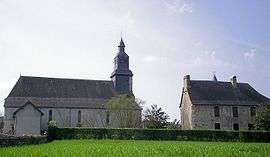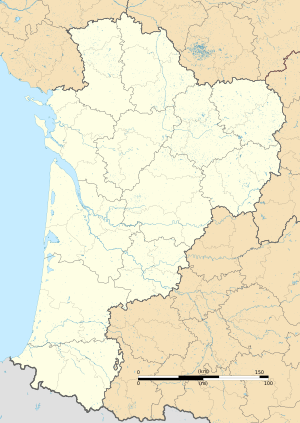Abos, Pyrénées-Atlantiques
Abos is a French commune in the Pyrénées-Atlantiques department in the Nouvelle-Aquitaine region in southwestern France.
Abos | |
|---|---|
 Church of St. John the Baptist | |
.svg.png) Coat of arms | |
Location of Abos 
| |
 Abos  Abos | |
| Coordinates: 43°21′32″N 0°33′43″W | |
| Country | France |
| Region | Nouvelle-Aquitaine |
| Department | Pyrénées-Atlantiques |
| Arrondissement | Pau |
| Canton | Le Coeur de Béarn |
| Intercommunality | Lacq-Orthez |
| Government | |
| • Mayor (2020-2026) | Jean-Pierre Cazalère |
| Area 1 | 8.45 km2 (3.26 sq mi) |
| Population (2017-01-01)[1] | 542 |
| • Density | 64/km2 (170/sq mi) |
| Demonym(s) | Abosiens, Abosiennes |
| Time zone | UTC+01:00 (CET) |
| • Summer (DST) | UTC+02:00 (CEST) |
| INSEE/Postal code | 64005 /64360 |
| Elevation | 108–250 m (354–820 ft) (avg. 123 m or 404 ft) |
| 1 French Land Register data, which excludes lakes, ponds, glaciers > 1 km2 (0.386 sq mi or 247 acres) and river estuaries. | |
The inhabitants of the commune are known as Abosiens or Abosiennes.[2]
Geography
Location
Abos is located 15 km north-west of Pau and 20 km southeast of Lescar, on the left bank of the Gave de Pau which is the north east boundary of the commune. Highway D2 (Route de Pau) passes through the commune; however, this route bypasses the village and Route D2002 must be taken to enter the village. The southeastern boundary of the commune is formed by Highway D229 (Chateau d'Abos).[3]
Hydrography
The commune is located in the Drainage basin of the Adour, with the Gave de Pau in the northeast and a number of streams in the commune feed into the La Baise river (and its tributary, the old channel of the mill, itself fed by the Arrious Brook) and Juscle.[3]
Localities and hamlets[4]
Neighbouring municipalities[3]
Toponymy
The name Abos is mentioned in 1116 and 1234[9] (Pierre de Marca[10]) and in the 13th century[11] (Fors de Béarn[12]).
It also appears in the forms:
- Abossium (1345,[11] Notaries of Pardies[13])
- Abos (1385,[9] census of Béarn[12])
- Abous (1538,[11] Reformation of Béarn[14])
- Abos (1630[9] Pierre de Marca[10] and in 1750[9] on the Cassini Map.[15]
Michel Grosclaude proposed a Latin etymology of Avus with the aquitaine suffix -ossum.[9]
The commune name in Béarnais is Abòs (according to the conventional standard of Occitan).
Aubrun was a farm in Abos which was mentioned in 1538 as La boyrie aperade d'Aubrun,[16] Reformation of Béarn B. 637[14] in the 1863 dictionary.
Cap de Castel is a hamlet in Abos mentioned by the dictionary in 1863.[5]
Paul Raymond said in 1863 that the Chateau of Abos or Castet-d'Abos, was a vassal of the Viscounts of Béarn.[6]
Donadon was a fief under the Viscounts of Béarn, mentioned in 1538[17] (reformation of Béarn[14]).
The fief of Idernes was a vassal of the Viscounts of Béarn and appeared in the forms:
Maucor was a fief of Abos, cited with the spelling of L'ostau de Maucoo in 1385[18] in the Census of Béarn.[12] This fief was a vassal of the Viscounts of Béarn then restored to the Bailiwick of Lagor and Pardies as was Saint Jean, another fief of Abos, also mentioned in 1385[19] (Census of Béarn[12]) in the form of L'ostau de Sent-Johan d'Abos.
Saint-Laurent, a hamlet and fief of Abos under the Viscounts of Béarn, was also restored to the Bailiwick of Lagor and Pardies. It was mentioned in the forms Sent-Laurentz d'Abos (1343,[8] Notaries of Pardies[13]) and Saint-Laurens d'Abos (1674,[8] Reformation of Béarn [14]).
History
Paul Raymond[11] noted that the commune had a Lay Abbey a vassal of the Viscounts of Béarn and in 1385, Abos depended on the bailiwick of Lagos and Pardies with 49 fires.
The Lord of Abos was of the first rank after the Barons (called ruffebaron) of Béarn.
Heraldry
.svg.png) Arms of Abos |
The arms of the commune of Abos are blazoned : Quarterly party per saltire, the first Vert, chimney of Or smoking argent flanked at dexter by a factory of Or; at second Gules, an ear of corn of Or leaved in Vert; at third Gules, a bunch of grapes of Or leaved in Vert; at fourth Vert, a church argent surmounting two cows of Or confronting. horned, collared and belled. |
Administration
List of Successive Mayors of Abos[20]
| From | To | Name | Party | Position |
|---|---|---|---|---|
| 1995 | 2014 | Jean-Marie Cazalère | ||
| 2014 | Current | Jean-Pierre Cazalère | DVD |
(Not all data is known)
Inter-communality
The town is a member of nine inter-communal organisations:[21]
- the community of communes of Lacq
- SIVU for the development and management of the river basin of the baïse
- AEP union for the Gave and the baïse;
- sanitation union of the communes of the valleys of Juscle and Baise
- Energy union for the Pyrenees-Atlantiques;
- inter-communal union of Monein;
- inter-communal union for defence against flooding of the Gave de Pau
- inter-communal union for forestry management for Gabe-Baise
- the inter-communal union for educational regrouping for Abos and Tarsacq
Population
| Year | Pop. | ±% |
|---|---|---|
| 2006 | 467 | — |
| 2007 | 472 | +1.1% |
| 2008 | 476 | +0.8% |
| 2009 | 482 | +1.3% |
| 2010 | 487 | +1.0% |
| 2011 | 492 | +1.0% |
| 2012 | 520 | +5.7% |
| 2013 | 527 | +1.3% |
| 2014 | 531 | +0.8% |
| 2015 | 535 | +0.8% |
| 2016 | 539 | +0.7% |
| 2017 | 542 | +0.6% |
| 1793 | 1800 | 1806 | 1821 | 1831 | 1836 | 1841 | 1846 | 1851 |
|---|---|---|---|---|---|---|---|---|
| 573 | 520 | 500 | 599 | 607 | 590 | 586 | 567 | 512 |
| 1856 | 1861 | 1866 | 1872 | 1876 | 1881 | 1886 | 1891 | 1896 |
|---|---|---|---|---|---|---|---|---|
| 507 | 459 | 484 | 478 | 468 | 445 | 432 | 411 | 397 |
| 1901 | 1906 | 1911 | 1921 | 1926 | 1931 | 1936 | 1946 | 1954 |
|---|---|---|---|---|---|---|---|---|
| 401 | 412 | 386 | 360 | 346 | 328 | 319 | 339 | 371 |
| 1962 | 1968 | 1975 | 1982 | 1990 | 1999 | 2006 | 2007 | 2008 |
|---|---|---|---|---|---|---|---|---|
| 432 | 479 | 462 | 467 | 479 | 481 | 467 | 472 | 476 |
| 2009 | 2010 | - | - | - | - | - | - | - |
|---|---|---|---|---|---|---|---|---|
| 482 | 487 | - | - | - | - | - | - | - |
Politics
Presidential Elections Second Round:[23]
| Election | Winning Candidate | Party | % | |
|---|---|---|---|---|
| 2017 | Emmanuel Macron | EM | 68.78 | |
| 2012 | François Hollande | PS | 57.29 | |
| 2007 | Ségolène Royal | PS | 54.67 | |
| 2002 | Jacques Chirac | RPR | 85.96 | |
Economy
The commune is part of the Jurançon AOC and Béarn AOC vineyard regions. Activity in the commune is mainly agricultural (livestock and corn).
The commune is also part of the Appellation d'origine contrôlée (AOC) zone designation of Ossau-iraty.
The 2006 classification of INSEE, indicated the median household incomes for each municipality with more than 50 households (30,687 communes out of the total 36,681 communes identified)[24] ranked Abos at 7513, for an income of €18,000 per person.
Culture and Heritage
Religious Heritage
The Church of Saint John the Baptist![]()
Facilities
The town has a primary school.
Notable people linked to the commune
- Didier Courrèges is a French horseman, a former high level event rider (CCE) and a member of the Cadre Noir - elite instructors at the National Riding School of Saumur. He now lives in Abos.
See also
External links
- Abos on Géoportail, National Geographic Institute (IGN) website (in French)
- Abos on the 1750 Cassini Map
Notes and references
Notes
References
- "Populations légales 2017". INSEE. Retrieved 6 January 2020.
- Inhabitants of Pyrénées-Atlantiques (in French)
- Google Maps
- Géoportail, IGN (in French)
- Topographic Dictionary of the Department of Basses-Pyrenees, p. 41 (in French)
- Topographic Dictionary of the Department of Basses-Pyrenees, p. 45 (in French)
- Topographic Dictionary of the Department of Basses-Pyrenees, p. 81 (in French)
- Topographic Dictionary of the Department of Basses-Pyrenees, p. 150 (in French)
- Michel Grosclaude, Topnymical Dictionary of communes, Béarn, Ed. Edicions reclams & Édition Cairn - 2006, ISBN 2-35068-005-3, page 192 (in French)
- According to Pierre de Marca, History of Béarn
- Topographic Dictionary of the Department of Basses-Pyrenees, Paul Raymond, Imprimerie nationale, 1863, Digitised from Lyon Public Library 15 June 2011, p. 2 (in French)
- Manuscript of the 14th century - Departmental Archives of Pyrénées-Atlantiques (in French)
- Notaries of Pardies - Departmental Archives of Pyrénées-Atlantiques (in French)
- Manuscript of the 16th to the 18th centuries - Departmental Archives of Pyrénées-Atlantiques (in French)
- Cassini Map 1750 - Abos
- Topographic Dictionary of the Department of Basses-Pyrenees, p. 16 (in French)
- Topographic Dictionary of the Department of Basses-Pyrenees, p. 57 (in French)
- Topographic Dictionary of the Department of Basses-Pyrenees, p. 110 (in French)
- Topographic Dictionary of the Department of Basses-Pyrenees, p. 149 (in French)
- List of Mayors of France (in French)
- Intercommunality of Pyrénées-Atlantiques, Cellule informatique préfecture 64, consulted on 9 November 2011
- National Commission for Decentralised cooperation (in French)
- http://www.lemonde.fr/data/france/presidentielle-2017/
- Statistical Summary by commune, département, and area of employment Archived 2012-06-04 at Archive.today, website: INSEE consulted on 9 September 2009
- Ministry of Culture, Mérimée IA64000566 Church of St. John the Baptist (in French)
| Wikimedia Commons has media related to Abos. |